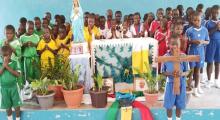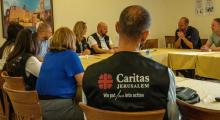Issued by the Catholic Center for Studies and Media - Jordan. Editor-in-chief Fr. Rif'at Bader - موقع أبونا abouna.org

It is precisely because Timor-Leste “is at the edge” of the world, that it is “at the centre of the Gospel!”
Pope Francis began his address to the East Timorese clergy, religious, and catechists by remarking that, despite its marginal position in the world, Timor-Leste is central to the Gospel, which often focuses on people on the margins.
“We know, that in the heart of Christ the ‘existential peripheries’ are the centre,“ he said, taking his cue from the introductory remarks of Bishop Norberto do Amaral of Maliana, the President of the Timorese Bishops' Conference.
The Pope then reflected on their work and challenges as described to him a few minutes earlier by a religious sister, a priest and a catechist, who shared their testimonies. He did so by recounting the story of Mary of Bethany anointing Jesus’ feet with an expensive perfume, drawn from the Gospel of John.
This story, the Pope said, tells us that “the fragrance of Christ and his Gospel” is “a gift that we must preserve and are called to spread.”
Using the metaphor of sandalwood, native to the region, he urged the Timorese clergy, religious and catechists to return to the essence of their faith, recognizing that they are the “fragrance of Christ” in Timor-Leste.
“As Mary of Bethany… we, too, must cherish the love with which the Lord has anointed us, so that it does not fade and lose its fragrance.”
The Holy Father also reminded them that this fragrance is not for their personal use but “for anointing the feet of Christ, proclaiming the Gospel and serving the poor,” and called on them to be vigilant against “lukewarm spiritual mediocrity”, that is “always lurking”.
He further stressed the need for continuous growth in knowledge of Christian doctrine and faith so as to help “purify” their culture “from “archaic and sometimes superstitious practices and traditions” that may conflict with Christian teachings.
On the other hand, the Pope encouraged them to value some “beautiful “ aspects of their culture, such as the belief in the resurrection and respect for the souls of the dead.
“Each culture and social group needs purification and growth” (EG, 69)”
Pope Francis went on to encourage the clergy and church workers in Timor-Leste to “spread the fragrance” of the Gospel, with zeal and courage, and to embrace a dynamic, missionary spirit. He used the image of Mary breaking the alabaster jar to anoint Jesus and that of a “Church on the move” mentioned by Sister Rosa in her testimony. “Evangelization, “he said “occurs when we have the courage to ‘break’ the jar containing the fragrance, breaking the ‘shell’ that often closes us” only to serve “our personal needs.”
The Pope therefore stressed the need for “a renewed impetus” toward evangelization in the country, “rooted in a long Christian history”, so that the Gospel’s fragrance may also foster reconciliation, peace, compassion, and justice after it has suffered years of war.
The fragrance of the Gospel, he insisted, is the fragrance of compassion, “which will help the poor get back on their feet”, and it must be spread to combat the social ills affecting East Timorese society, like violence, alcoholism, and disrespect for women.
To this end there, Timor-Leste needs “passionate, prepared and creative” clergy, consecrated persons and catechists.
Referring specifically to priests, Pope Francis urged them to remain humble and not to take advantage of their role for personal gain or social prestige: “You should always bless and console; always be a minister of compassion and a sign of God’s mercy, he said.
Pope Francis concluded his address with the words of Father Sancho who in his testimony reminded the audience that “God knows how to take care of those He has called and sent on His mission”.
In another moving moment in Timor-Leste, Pope Francis visited disabled children on Tuesday, September 10, marking the first event of his second day in this young Catholic nation.
As Pope Francis arrived at the Irmãs Alma School, the streets were filled with people eager to greet him. A group of children, dressed in traditional clothing, welcomed him, accompanied by a choir of singing sisters.
In the San Vincenzo de' Paoli hall, 50 children and 28 sisters waited patiently. Three children, encouraged by one of the sisters, approached the Holy Father and presented him with a traditional scarf called a tais.
Sister Getrudis Bidi, the Superior of the congregation, then welcomed the Pope and shared the school's mission, which has been ongoing for sixty years. She spoke about their work caring for children with various disabilities and disadvantages, describing them as "treasures entrusted by God." Throughout this intimate encounter, three children sat quietly at the Pope’s feet.
In a brief address, Pope Francis spoke about The Final Judgment, explaining that when Jesus invites people to "come with me," it is not because they were baptized or confirmed, or lived perfectly, but because "you looked after me."
Jesus calls people to follow him because they showed care and compassion for others.
The Pope referred to this as "the sacrament of the poor," describing it as a love that "moves, builds, and strengthens." He pointed out that this love is clearly present at Irmãs Alma School, and without it, the school's work would not be possible.
He concluded by expressing his gratitude, saying "I want to thank you for all that you do, and I also want to thank the children—these boys and girls who bear witness and allow themselves to be cared for. They teach us how to let God care for us."
Pope Francis then turned his attention to a boy in the care of the school named Silvano. He asked that Silvano be brought to him, and as he took the boy's hand, he thanked him for allowing the sisters to care for him. "Just as Silvano allows himself to be cared for, we too must learn to let ourselves be cared for," the Pope said.
To commemorate the 60th anniversary of the school, Pope Francis signed a plaque before waving goodbye to the singing children.







